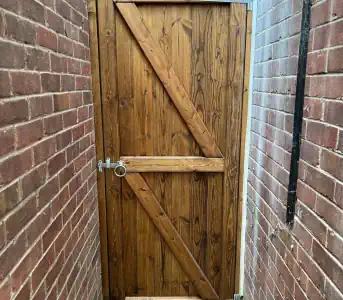Gates, to many homes, aren’t just barriers. They symbolise protection, privacy, and sometimes, a bit of style. At the core of a gate’s functionality and security are hinges, locks, and latches. These elements, simple as they might seem, are vital in keeping our homes safe. So, here’s a dive into the essentials of gate hardware for any homeowner aiming for style, effectiveness, and exceptional security.

Hinges: The Unsung Heroes
You might not notice them, but hinges are the backbone of every gate or door. They shoulder the weight and promise smooth, quiet movement. Over time, a variety of hinges have emerged, each tailored to specific gate needs.
For example, the barrel hinge offers a complete rotation, while the T-hinge stands out for supporting hefty weights. When choosing a hinge, it’s essential to think about its material, how much weight it can hold, and the climate it’ll face. With the best hinge in place, your gate’s performance and lifespan can soar.
Locks: Defenders of the Doorway
Locks are clearly champions of gate security. They’ve evolved massively, from ancient wooden beams to modern biometric wonders. But it’s not just about locking or unlocking. It’s about the type of lock, how long it’ll last, and how safe it’ll keep your home.
If you live in the city you might opt for a robust deadbolt, whereas someone in a quiet village might settle for a regular latch bolt. However, as smart homes become commonplace, electronic locks with features like remote access are becoming popular. Whatever you choose, knowing how it works and keeping it in top shape is key.
Latches: The Overlooked Protectors
While locks often steal the spotlight, latches play a vital yet understated role in our security setup. They’re more than just simple mechanisms; they provide a level of safety and convenience that shouldn’t be underestimated.
Why Consider Latches?
- Quick Access: Latches offer a quicker way to secure a door or gate, especially when you’re moving in and out frequently.
- Child Safety: They’re great for areas where you want to prevent young kids from wandering, like garden gates or certain rooms.
- Variety: From thumb latches to bolt latches, there’s a style to suit every need and preference.
Getting the Most Out of Your Latch:
- Installation: A well-fitted latch works best. Understanding its mechanism and ensuring it’s installed correctly makes it more effective.
- Regular Maintenance: Just like any other hardware, latches benefit from:
– Oiling: This helps in smooth operation and reduces wear over time.
– Routine Checks: Regularly inspect your latch for any wear and tear or damage. A little attention can go a long way in extending its life.
Materials Matter: Brass or Stainless Steel?
Your gate’s fixture material can make a big difference. Classic materials like brass have a timeless appeal and decent wear resistance. Meanwhile, stainless steel, known for resisting rust, works well in damp or salty places. Newer materials like carbon fibre might soon make an appearance in gate hardware, promising strength and less weight..
Maintenance: The Key to Longevity
Regular care is crucial for the efficiency and life of your hinges, locks, and latches. A routine check, tightening any slack parts, greasing, and cleaning can hugely boost their performance. Ignoring small problems could result in bigger issues later on. While there are plenty of DIY fixes, sometimes it’s best to call in the professionals.
Final Thoughts
The realm of gate fixtures is broad and constantly changing. Every piece, from the simple hinge to the high-tech lock, plays a part in keeping our homes safe. By getting to grips with the details, homeowners can make wise choices, ensuring durable, efficient, and highly secure gates.If you’re looking for quality gate hardware, we have a great selection to offer here at Clacton Landscapes . Explore our range or get in touch with our team today!
FAQs
How often should I look after my gate’s hinge?
It’s good practice to check and grease gate hinges every six months to keep them working well and reduce wear.
What’s the advantage of electronic locks?
Electronic locks offer enhanced security, and real-time alerts, and often integrate seamlessly with home security systems.
How are latches different from locks?
Latches are usually secondary security, ideal for short-term closures, whereas locks are the primary security for gates.
Can I self-install locks and latches?
With the right tools and guidance, yes. However, complex installations might benefit from professional expertise.
Why do hinges occasionally squeak?
Squeaking typically results from friction. Cleaning and periodic lubrication can effectively mitigate this.
Which material is best for coastal areas?
For places with humidity or salt in the air, stainless steel is a top choice thanks to its rust resistance.




